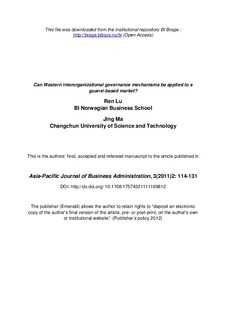Can Western interorganizational governance mechanisms be applied to a guanxi-based market?
Journal article, Peer reviewed
Permanent lenke
http://hdl.handle.net/11250/93446Utgivelsesdato
2011Metadata
Vis full innførselSamlinger
- Scientific articles [2181]
Originalversjon
http://dx.doi.org/ 10.1108/17574321111169812Sammendrag
Purpose — The emergence of “interorganizational marketing” as a hot topic leads to one key question: can interorganizational governance mechanisms (socialization, incentives, and monitoring) offered by marketing theory be applied to China, an emerging economy characterized by the Chinese guanxi relationship? This paper finds that the answer is “yes” and develops a theoretical model to show such interactions.
Design/methodology/approach — The paper applies interorganizational strategies to interpersonal relationships. Guanxi was categorized into three categories – family members, helpers and business partners – which meet each of the three governance mechanisms (in addition to favoring exchange as a special and typical Chinese governance mechanism) in the model.
Findings — Through ex-post role activation, the paper argues that guanxi is a dynamic balance and the ways in which various governance mechanisms can set roles will lead to the roles either changing (reinforcement or dilution) or switching (helper to business partner, and vice versa). It seems futile to implement external governance mechanisms on family ties (the main category of guanxi) that have been firmly rooted in Chinese culture. On the other hand, applying the four mentioned governance mechanisms could reinforce, maintain, or dilute helper and business partner roles, or even make it possible to switch from one to another.
Originality/value — The paper proposes a new concept regarding relationship marketing, namely the application of governance mechanisms to interpersonal relationships, which provides people doing business in China with a new perspective for reference.
Beskrivelse
This is the authors’ final, accepted and refereed manuscript to the article
